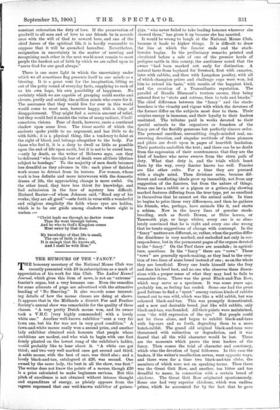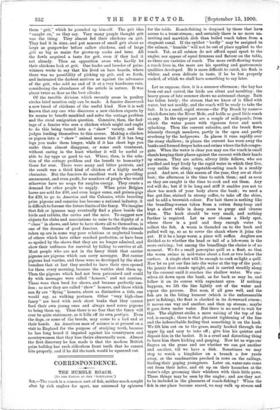THE HUMOURS OF THE "FANCY."
THE honorary secretary of the National Mouse Club was recently presented with £8 in subscriptions as a mark of appreciation of his work for this Club. The Ladies' Kennel Journal, which gives this item of news, is not an " extreme " fancier's organ, but a very humane one. Even the remedies for some ailments of pugs are advertised with the attractive heading of " No Starving." It also records some interest- ing details of how the mouse classes are doing at shows. It appears that in the Midlands a district Fur and Feather Society's annual show was remarkable for the quality of these classes. "A very pretty Dutch mouse won, and its owner took a V.H.C. [very highly commended] with a lovely white one." Another well-known exhibitor "sent a very fat fawn one, but his fur was not in very good condition." A fawn-and-white mouse easily won a second prize, and another lady exhibitor obtained such honours that people whose ambitions are modest, and who wish to begin with one foot firmly planted on the lowest rung of the exhibitor's ladder, would probably like to hear about it. "A white one got third; and two very well marked ones got second and third. A sable mouse, with the best of ears, was third also; and a lovely black-and-tan, catalogued at £20, was second. One owned by the same lady, the best in all the show, was first." The writer does not know the points of a mouse, though £20 is a price calculated to make beginners envious. But this pitch of excellence is not obtained without intense thought and expenditure of energy, as plainly appears from the regrets expressed that one well-known exhibitor of guinea-
pigs, "who never failed to take leading honours wherever she showed them," has given it up because she has married.
It would be wrong to laugh at the National Mouse Club, because it leads to higher things. It is difficult to draw the line at which the fancier ends and the stock- breeder begins. In the preliminary remarks printed and circulated before a sale of one of the premier herds of pedigree cattle in this county, the auctioneer noted that the owner " had been marked out early for distinction. A natural taste from boyhood for livestock, first with canaries, later with rabbits, and then with Langshan poultry, with all of which champion prizes and challenge cups were won, led him to extend his taste," with results of the happiest kind, and the creation of a Transatlantic reputation. The parallel of Dandie Dinmont'a terriers occurs, they being entered first to " stots and rotten, then to tods and brooks." The chief difference between the "fancy" and the stock- breeders is the vivacity and vigour with which the devotees of the former differ on the subjects most dear to them. Their surplus energy is immense, and their loyalty to their leaders unstinted. The tributes paid in works devoted to their special animals to the organisers or founders of the fancy are of the floridly generous but perfectly sincere order. The personal sacrifices, unremitting single-minded zeal, un- swerving devotion, and singular rectitude of these pioneers and pilots are dwelt upon in pages of heartfelt laudation. Their portraits embellish the text; and there can be no doubt from the expression of their countenances that they are the kind of leaders who never swerve from the stern path of duty. What that duty is, and the trials which beset them by the way, every fancier knows too well. Fancies are like other cults. For a time they are pursued with a single mind. Then divisions arise, because dif- ferent and conflicting ideals grow up insensibly, not from any suggestion of the fanciers, but from the nature of things. Some one has a rabbit or a pigeon or a guinea-pig showing marked features differing from the true type, yet so excellent in themselves that he cannot set the animal aside. In time he begins to prize these very differences, and then he gathers his friends, who, perhaps, have animals like it, and starts a schism. Now in the heavy lines of genuine stock- breeding, such as South Downs, or Shire horses, or Tamworth pigs, or large whites, every one is so abso- lutely convinced that he is right and every one else wrong that he treats suggestions of change with contempt. In the "fancy" matters are different, or, rather, when the parties differ the dissidence is very marked, and embodied not only in cor- respondence, but in the permanent pages of the organs devoted to the " fancy." On the Turf there are scandals ; in agricul- ture, questions. In the " fancy " there are " rows." These "rows" are generally epoch-making, as they lead to the crea- tion of two lines of some breed instead of one ; so on the whole they are beneficial. Every one hurls himself into the fray and does his level best, and no one who observes these dissen- sions with a proper sense of what they may lead to fails to remember them. There was the great Black-and-Tan Row, which may serve as a specimen. It was some years ago, probably ten, so feeling has cooled. Some one had the great good fortune to find a " sport" among various kinds of rabbits turned out to run wild, which was like a wild rabbit, but was coloured black-and-tan. This was promptly domesticated, and a new and desirable breed, just like wild rabbits, only black-and-tan, was founded. All their points were maintained, even "the wild expression of the eye." But people could not let them alone, and began to exhibit black-and-tans with lop-ears and so forth, degrading them to a mere hutch-rabbit. The grand old original black-and-tans were threatened with extinction or degradation, and it was feared that all the wild character would be lost. These are the moments which prove the true leaders of the fancy. Then comes the trial of character and constancy, which wins the devotion of loyal followers. In this case the leaders, if the writer's recollection serves, went opposite ways, and there were for a time two black-and-tan clubs, the members of which were not on speaking terms. Then there was the Great Grit Row, and another, too bitter and too dreadful to name, in connection with a certain breed of chickens. The Great Grit Row originated spontaneously. Some one had very superior chickens, which won endless prizes, which he accounted for by the fact that he gave
them " grit," which he pounded up himself. The grit idea " caught on," as they say. Very many people thought grit was the thing. They almost fed their chickens on grit. They had it in sizes, and put saucers of small grit about as large as gunpowder before callow chickens, and of large grit as big as maize for grown-up cocks and hens. All the fowls acquired a taste for grit, even if they had it not already. Then an opposition arose who hardly let their chickens look at grit. One leader and breeder of prize- winners wrote to say that his lived on bare boards, where there was no possibility of picking up grit, and so forth, and insinuated the darkest motives as against the advocates of the grit, who sold no end of it at a very handsome rate, considering the abundance of the article in nature. It was about twice as dear as the best oilcake.
Of the terrible division which recently arose in poultry circles brief mention only can be made. A fancier discovered a new breed of chickens of the useful kind. Now it is well known that any one who discovers a new chicken expects by its means to benefit mankind and solve the cottage problem and the rural emigration question. Conceive, then, the feel- ings of a fancier who sees a chicken which might and ought to do this being turned into a " show " variety, and the judges lending themselves to this course. Making a chicken or pigeon into a " show " animal means that if it has long legs you make them longer, while if it has short legs you make them almost disappear, or some such treatment, without caring in the least whether it will be useful or able to lay eggs or good to eat. Where, then, is the solu- tion of the cottage problem and the benefit to humanity ? Gone for ever. There were many and bitter protests, and the result was a third kind of chicken of a highly useful character. But the fanciers do excellent work in providing amusement, and even profit, for numbers of people who would otherwise have no scope for surplus energy. They create a demand for other people to supply. When prize Belgian hares are sold for £60, and even larger sums, and guinea-pigs for £20, to go to America and the Colonies, while breeding prize pigeons and canaries has become a national industry, it is difficult to foresee the future limits of the fancy. We imagine that fish or iguanas may eventually find a place beside the birds and rabbits, the cavies and the mice. To suggest new objects for clubs and associations to raise to the dignity of a " class " in shows, and later to have shows all to themselves, is one of the dreams of good fanciers. Generally the animals taken up are in some way poor relations or neglected breeds of others which have either reached perfection, or have been so spoiled by the shows that they are no longer admired, and show their unfitness for survival by failing to survive at all. Most people who are not in the fancy think that carrier pigeons are pigeons which can carry messages. But carrier pigeons had wattles, and these were so developed by the show breeders that at last they needed to have their eyes opened for them every morning, because the wattles shut them up. Then the pigeons which had not been patronised and could fly with messages were called " homers," and not carriers. These were then bred for shows, and became perfectly use- less ; so now they are called "show" homers, and those which can fly are " flying " homers, about as distinctive a title, one would say, as walking postmen. Other "very high-class fancy" are bred with such short beaks that they cannot feed their own young ones and always need nurse pigeons to bring them up. Thus there is no fear that the fancy will ever be quite stationary, as it kills off its own proigggs. Even the dogs, or some of the breeds, may come to a bad end at their hands. An American man of science is at present on a visit to England for the purpose of studying teeth, because he has long heard it imputed against his countayinen and countrywomen that they lose theirs abnormally soon. Almost the first discovery he has made is that the modern British prize bulldog has such ridiculous front teeth that he cannot bite properly, and if he did the teeth would be squeezed out;







































 Previous page
Previous page